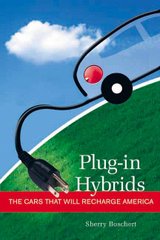The Large Volume Manufacturers, the automakers with obligations under the California Air Resources Board (CARB) Zero Emission Vehicle Program, have made a joint comment about the staff proposed revisions that will be voted on Thursday March 27 in Sacramento. It can be seen here (comment #121) along with 187 other public comments (overwhelmingly asking for a stronger mandate for plug-in cars) on the CARB website. Despite the various positions advanced by each automaker independently, they overcame their differences to say they “remain very concerned” that “provisions being proposed by Staff are overly stringent.” The letter states that the Staff recommendation has increased the volume of ZEVs and PHEVs required from 2012-2014 and this would result in additional costs of up to $3.4 billion. An accompanying chart shows the increases.
But the explanation is disingenuous. The chart compares the November 2007 Concept Paper to the February 2008 45-day Notice, which results in a possible increase of 630 zero-emission vehicles. Yes, 630 vehicles over a three year period from 2012 to 2014. What is missing in this presentation is the ZEV Program requirements endorsed by CARB in 2003, the requirements as they stand now. Back then, when the intention was to kill the electric car, automakers signed on to an “alternative path” replacing battery electric vehicles with fuel cell vehicles. An obligation to manufacture a meaningful percentage of electric cars dropped down to a required 250 FCVs by 2008, then 2500 by 2012, and then 25,000 by 2015. But what happened to the 25,000 ZEVs in the automaker’s plea? Absent of course, since including it would make clear that the staff revision in fact lops off 90% of the 2003 ZEV requirement. The automakers bemoan a supposed 25% increase, while ignoring what is actually a 90% reduction.
Chutzpah.
Tuesday, March 25, 2008
Friday, March 21, 2008
Electric Subaru: Tell 'em what you think

Subaru has brought some R1e electric mini-cars to NY. They have a program with Tokyo Electric Power Company that has been testing vehicles in Japan since 2006. Now, they're at the NY Auto Show, and two of them are joining the New York Power Authority fleet. Much like the Th!nk City that NYPA also tested, the cars have a 50 miles range with a 65 mile per hour top speed. Any interest in such a car? Subaru wants to know. Visit the bottom of their R1e webpage here to send them comments.
Sunday, March 9, 2008
Electric Coops Use Aptera EV in Ad
Touchstone Energy Cooperatives has made an ad touting its preparedness to deliver electricity whatever needs it in the future.
Hattip to Domenick Yoney - AutoblogGreen
Hattip to Domenick Yoney - AutoblogGreen
Wednesday, March 5, 2008
Automakers Losing Religion; CARB Keeps Unfounded Faith
The expense and impracticality of hydrogen fuel cell powered cars is beginning to dawn on the major automakers. Batteries will do within a few short years what H2 advocates can only dream. The Wall Street Journal reports GM, Toyota Doubtful on Fuel Cells' Mass Use.
 General Electric has invested $4 million in Th!nk Global, and $20 million in A123. Business Week reports GE plugs into electric car investments. And Th!nk has debuted a larger concept car, which it has developed with an unnamed major automaker. Green Wombat has more info here.
General Electric has invested $4 million in Th!nk Global, and $20 million in A123. Business Week reports GE plugs into electric car investments. And Th!nk has debuted a larger concept car, which it has developed with an unnamed major automaker. Green Wombat has more info here.
Pretty soon it might be down to BMW and Honda advertising the dream, with the California Air Resources Board acting as enabler. CARB staff is recommending lowering once again the required number of zero emission vehicles - this time by a mere 90%! Honda, the supposed H2 true believer, is actually given an incentive to produce fewer of its much touted Clarity FCV.
The Air Resources Board could probably find a way to lead by prodding early commercialization of battery ZEVs, but instead it appears to be regulating itself into irrelevancy.
Top executives from General Motors Corp. and Toyota Motor Corp. Tuesday expressed doubts about the viability of hydrogen fuel cells for mass-market production in the near term and suggested their companies are now betting that electric cars will prove to be a better way to reduce fuel consumption and cut tailpipe emissions on a large scale.Further evidence that the action is in electric cars and the batteries that will energize them:
 General Electric has invested $4 million in Th!nk Global, and $20 million in A123. Business Week reports GE plugs into electric car investments. And Th!nk has debuted a larger concept car, which it has developed with an unnamed major automaker. Green Wombat has more info here.
General Electric has invested $4 million in Th!nk Global, and $20 million in A123. Business Week reports GE plugs into electric car investments. And Th!nk has debuted a larger concept car, which it has developed with an unnamed major automaker. Green Wombat has more info here.Pretty soon it might be down to BMW and Honda advertising the dream, with the California Air Resources Board acting as enabler. CARB staff is recommending lowering once again the required number of zero emission vehicles - this time by a mere 90%! Honda, the supposed H2 true believer, is actually given an incentive to produce fewer of its much touted Clarity FCV.
The Air Resources Board could probably find a way to lead by prodding early commercialization of battery ZEVs, but instead it appears to be regulating itself into irrelevancy.
Subscribe to:
Posts (Atom)


